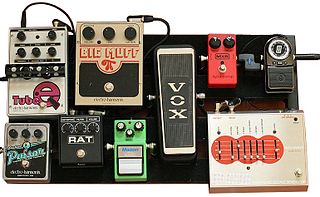
An effects unit or effects pedal is an electronic device that alters the sound of a musical instrument or other audio source through audio signal processing.

Vox is a British musical equipment manufacturer founded in 1957 by Thomas Walter Jennings in Dartford, Kent, England. The company is most famous for making the Vox AC30 guitar amplifier, used by The Beatles, The Rolling Stones, The Kinks, The Yardbirds, Queen, Dire Straits, U2, and Radiohead; the Vox Continental electric organ, the Vox wah-wah pedal used by Jimi Hendrix, and a series of innovative electric guitars and bass guitars. Since 1992, Vox has been owned by the Japanese electronics firm Korg.

A guitar amplifier is an electronic device or system that strengthens the electrical signal from a pickup on an electric guitar, bass guitar, or acoustic guitar so that it can produce sound through one or more loudspeakers, which are typically housed in a wooden cabinet. A guitar amplifier may be a standalone wood or metal cabinet that contains only the power amplifier circuits, requiring the use of a separate speaker cabinet–or it may be a "combo" amplifier, which contains both the amplifier and one or more speakers in a wooden cabinet. There is a wide range of sizes and power ratings for guitar amplifiers, from small, lightweight "practice amplifiers" with a single 6-inch speaker and a 10-watt amp to heavy combo amps with four 10-inch or four 12-inch speakers and a 100-watt amplifier, which are loud enough to use in a nightclub or bar performance.

12AX7 is a miniature dual-triode 6AV6 vacuum tube with high voltage gain. Developed around 1946 by RCA engineers in Camden, New Jersey, under developmental number A-4522, it was released for public sale under the 12AX7 identifier on September 15, 1947.

KT66 is the designator for a beam power tube introduced by Marconi-Osram Valve Co. Ltd. (M-OV) of Britain in 1937 and marketed for application as a power amplifier for audio frequencies and driver for radio frequencies. The KT66 is a beam tetrode that utilizes partially collimated electron beams to form a low potential space charge region between the anode and screen grid to return anode secondary emission electrons to the anode and offers significant performance improvements over comparable power pentodes. In the 21st century, the KT66 is manufactured and used in some high fidelity audio amplifiers and musical instrument amplifiers.

Marshall is a British company that designs and manufactures music amplifiers, speaker cabinets, brands personal headphones and earphones, drums and bongos. The company also owns a record label called Marshall Records. It was founded in London by drum shop owner and drummer, Jim Marshall, and is now based in Bletchley, Milton Keynes, England.

Electro-Harmonix is a New York City-based company that makes electronic audio processors and sells rebranded vacuum tubes. The company was founded by Mike Matthews in 1968. It is best known for a series of guitar effects pedals introduced in the 1970s and 1990s. EHX also made a line of guitars in the 1970s.

The EL34 is a thermionic vacuum tube of the power pentode type. The EL34 was introduced in 1955 by Mullard, who were owned by Philips. The EL34 has an octal base and is found mainly in the final output stages of audio amplification circuits; it was also designed to be suitable as a series regulator by virtue of its high permissible voltage between heater and cathode and other parameters. The American RETMA tube designation number for this tube is 6CA7. The USSR analog was 6P27S.
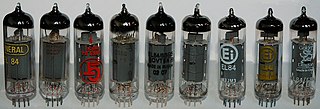
The EL84 is a vacuum tube of the power pentode type. It is used in the power-output-stages of audio-amplifiers, most commonly now in guitar amplifiers, but originally in radios. The EL84 is smaller and more sensitive than the octal 6V6 that was widely used around the world until the 1960s. An interchangeable North American type is the 6BQ5.
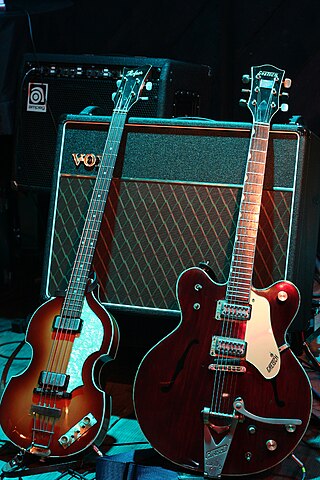
The Vox AC30 is a guitar amplifier manufactured by Vox. It was introduced in 1958 to meet the growing demand for louder amplifiers. Characterised by its "jangly" high-end sound it has become widely recognized by British musicians and others, such as George Harrison and John Lennon of the Beatles, Bill Wyman of the Rolling Stones, Brian May of Queen, Dave Davies of the Kinks and Hank Marvin.

Musitronics, often shortened to Mu-tron, was a manufacturer of electronic musical effects active in the 1970s. Founded by Mike Beigel and Aaron Newman, the company's products provided filtering and processing effects and were derived from synthesizer components. The company was known for producing high-quality products with many user-adjustable parameters, but high production costs and a failed product line, the Gizmotron, caused its downfall.
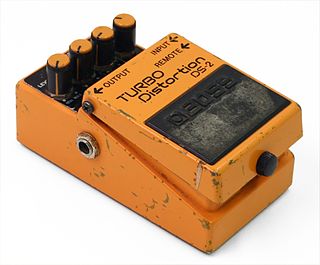
Distortion and overdrive are forms of audio signal processing used to alter the sound of amplified electric musical instruments, usually by increasing their gain, producing a "fuzzy", "growling", or "gritty" tone. Distortion is most commonly used with the electric guitar, but may also be used with other electric instruments such as electric bass, electric piano, synthesizer and Hammond organ. Guitarists playing electric blues originally obtained an overdriven sound by turning up their vacuum tube-powered guitar amplifiers to high volumes, which caused the signal to distort. While overdriven tube amps are still used to obtain overdrive, especially in genres like blues and rockabilly, a number of other ways to produce distortion have been developed since the 1960s, such as distortion effect pedals. The growling tone of a distorted electric guitar is a key part of many genres, including blues and many rock music genres, notably hard rock, punk rock, hardcore punk, acid rock, and heavy metal music, while the use of distorted bass has been essential in a genre of hip hop music and alternative hip hop known as "SoundCloud rap".
The KT88 is a beam tetrode/kinkless tetrode vacuum tube for audio amplification.
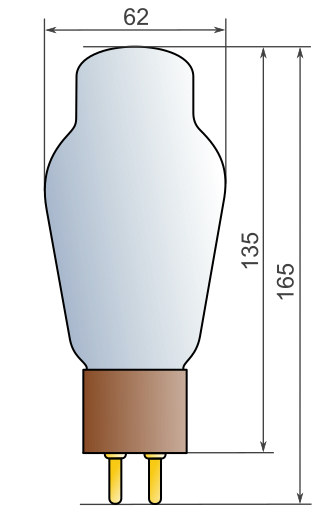
In electronics, the 300B is a directly-heated power triode vacuum tube with a four-pin base, introduced in 1938 by Western Electric to amplify telephone signals. It measures 6.4 inches high and 2.4 inches wide, and the anode can dissipate 40 watts. In the 1980s it started to be used increasingly by audiophiles in home audio equipment. The 300B has good linearity, low noise and good reliability; it is often used in single-ended triode (SET) audio amplifiers of about eight watts output; a push-pull pair can output 20 watts.

The Epiphone Valve Junior is a small 5 watt class A electric guitar amplifier.
The Standel Company is an American company that makes guitar amplifiers. It was founded in 1953 by Robert "Bob" Crooks in Temple City, California. Standel was the name of Crooks' side-business of radio and hi-fi repair, located in his garage at 10661 Freer Street, Temple City, California.
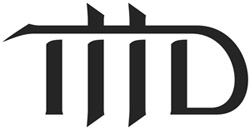
THD Electronics, Ltd. is a manufacturer of amplifier accessories, and a former manufacturer of vacuum-tube guitar amplifiers. It is located in Seattle, Washington. It was founded in 1986 by President and CEO Andrew Marshall. At one time specializing in hand-built, vacuum tube “boutique”-style amplifiers, it continues to manufacture the “world’s best selling [guitar amplifier] power attenuator,” the THD Hot Plate. The company is well known in the boutique amplifier market, and is often credited with the creation of this market in the United States. THD's line of products stayed relatively small despite its 22-year history as a company. Of its amplifiers, THD made three: the UniValve, BiValve-30, and Flexi-50.

The Big Muff Pi (π), often known simply as the Big Muff, is a fuzzbox produced in New York City by the Electro-Harmonix company, along with their Russian sister company Sovtek, primarily for use with the electric guitar. It is used by bassists as well due to the Big Muff's squeaky frequency response.

Traynor is a brand of bass amplifiers and guitar amplifiers, the first brand formed by Yorkville Sound. The Traynor brand, named for founder Peter Traynor, began in 1963 with the Dynabass bass amplifier, a rental product. Traynor first became popular in Canada by providing less expensive versions of the circuits used in Marshall and Fender amplifiers of the time. The revived brand now produces a wide range of electric, acoustic, and bass guitar amps.

Vintage musical equipment is older music gear, including instruments, amplifiers and speakers, sound recording equipment and effects pedals, sought after, maintained and used by record producers, audio engineers and musicians who are interested in historical music genres. While any piece of equipment of sufficient age can be considered vintage, in the 2010s the term is typically applied to instruments and gear from the 1970s and earlier. Guitars, amps, pedals, electric keyboards, sound recording equipment from the 1950s to 1970s are particularly sought. Musical equipment from the 1940s and prior eras is often expensive, and sought out mainly by museums or collectors.

















